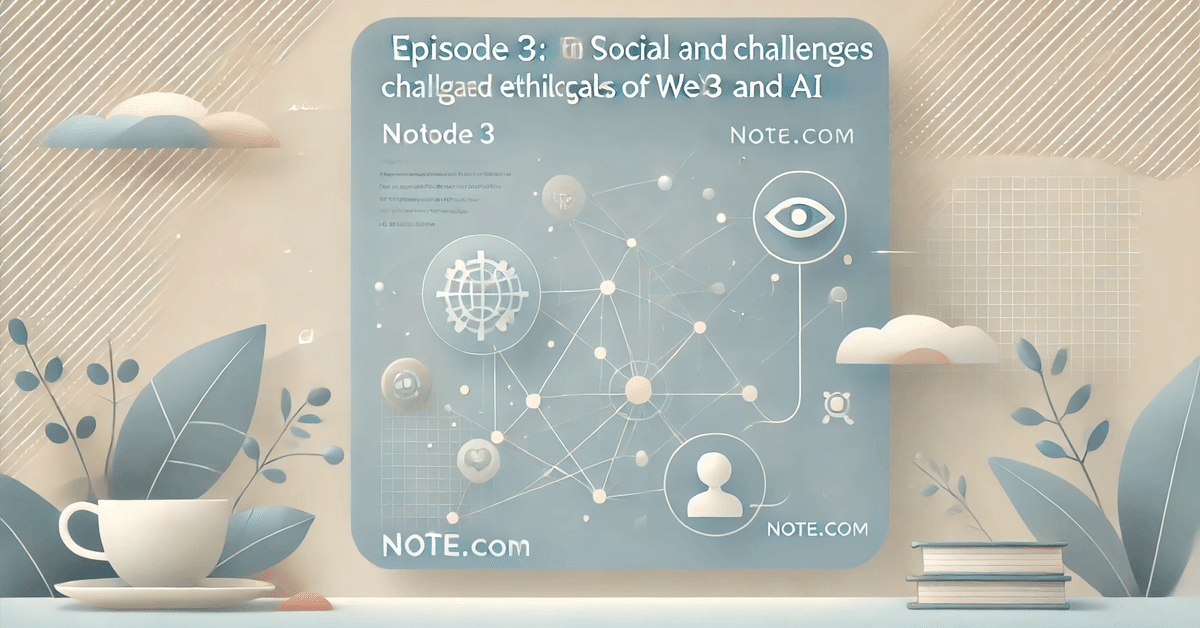
第3話目: Web3とAIの社会的・倫理的課題: 技術がもたらす影響とは? Episode 3: Social and Ethical Challenges of Web3 and AI: How Technology Impacts Society
Web3とAIがもたらす社会的・倫理的課題
Web3とAIは、次世代の技術として注目を集め、社会やビジネスのあり方を根本的に変える可能性を秘めています。しかし、これらの技術が広く普及することで、私たちの生活や倫理観に与える影響についても慎重に考える必要があります。特に、社会的・倫理的な課題が浮上しており、それにどう対応するかが重要な議論のポイントとなっています。
1. プライバシーの侵害とデータの取り扱い
AIやWeb3が膨大なデータを扱うことで、私たちのプライバシーはこれまで以上に脅かされるリスクが高まっています。たとえば、AIを活用した健康診断アプリが、ユーザーの健康情報を集めて予測を行う際、そのデータがどのように保管され、誰にアクセス権があるのかが問題になります。また、ブロックチェーン技術を使って個人の取引履歴が公開される場合、悪意のある第三者がその情報を追跡し、不正に利用されるリスクも考えられます。具体例としては、FacebookやGoogleが集める膨大なユーザーデータが、広告のターゲティングに利用されることでプライバシー侵害が議論されています。
2. 自動化による雇用への影響
AIの発展により、さまざまな業務が自動化されつつあります。たとえば、コンビニエンスストアのセルフレジや、工場でのロボットによる組立作業がすでに普及しています。これにより、効率化が進む一方で、人間の労働力が不要になる領域が広がる可能性があります。特に、単純労働や繰り返しの業務がAIに置き換えられることで、多くの従業員が職を失う可能性があるため、社会的格差の拡大が懸念されています。具体例としては、米国のAmazon倉庫でロボットが労働者の仕事を補完する形で導入されていますが、同時に労働者の数が減少しているという報告もあります。
3. 偏りと差別の再生産
AIは膨大なデータをもとに学習するため、そのデータ自体に偏りが含まれている場合、AIの判断にも偏りが生じることがあります。たとえば、採用面接にAIを導入した企業で、過去の採用データが男性中心だった場合、AIが女性やマイノリティを低く評価する可能性があります。具体的な例としては、アマゾンが開発した採用AIが、男性候補者を優先するバイアスがあるとして使用が中止された事例があります。このように、AIは公平な判断をするものだと思われがちですが、実際にはデータの偏りにより差別を助長するリスクがあるのです。
4. ディセントラライズドな責任の所在
Web3の分散型ネットワークは、中央集権的な管理が不要であることが強調されますが、その一方で責任の所在が曖昧になるという問題も浮上しています。たとえば、暗号資産取引所がハッキングされ、資産が盗まれた場合、誰がその損害を補償するのかが明確ではありません。具体的な例として、2021年にDeFiプロジェクトの一つがハッキングされ、何百万ドルもの資金が失われましたが、中央管理者がいないため、被害者は適切な補償を受けることができませんでした。こうしたケースでは、法的な枠組みやガバナンスのルール作りが急務です。
次回予告:技術の成功事例と実装方法
次回の第四話では、これまで取り上げた社会的・倫理的課題に対して、具体的な解決方法や成功事例を紹介します。技術がどのように現実の問題に対応し、どのような成果を上げているのかを、実装方法とともに掘り下げて解説します。これにより、Web3やAIが社会をどのように前向きに変革していけるのか、その可能性を見出すことができるでしょう。
さらに、詳細な技術的解説や上級者向けの実装例、最新の研究結果については、上級者編としてKindleで提供予定です。より深い理解を目指したい方は、こちらのリンクからお求めください。
English Version
Social and Ethical Challenges Brought by Web3 and AI
Web3 and AI are hailed as next-generation technologies with the potential to fundamentally change how society and businesses operate. However, as these technologies become more widespread, we must also carefully consider their impact on our daily lives and ethical standards. Specifically, several social and ethical challenges have emerged, and it is crucial to address them.
1. Privacy Invasion and Data Handling
As AI and Web3 handle vast amounts of data, the risk of violating privacy becomes increasingly high. For example, health diagnostic apps that utilize AI collect users' health data to make predictions. But how that data is stored and who has access to it is a significant concern. Similarly, when blockchain technology is used to make transaction histories public, malicious actors may exploit the information. A concrete example is the ongoing debate surrounding Facebook and Google’s massive data collection, which is used for ad targeting and raises concerns about privacy invasion.
2. Impact of Automation on Employment
AI development is automating various tasks, such as self-checkout systems at convenience stores and robots assembling products in factories. While this improves efficiency, it also raises concerns about the growing number of jobs that could become unnecessary. In particular, simple or repetitive tasks are being replaced by AI, potentially causing many workers to lose their jobs and exacerbating social inequality. For instance, Amazon’s warehouses in the U.S. have introduced robots to complement human workers, but reports also suggest a reduction in the number of employees.
3. Bias and Reproduction of Discrimination
AI learns from vast datasets, so if the data itself is biased, AI decision-making will reflect those biases. For example, a company using AI for recruitment may disadvantage women or minorities if its past hiring data was predominantly male. A concrete case is Amazon’s recruitment AI, which was scrapped after it was found to favor male candidates. Although AI is often seen as neutral, it can reinforce discrimination if the underlying data is biased.
4. Decentralized Accountability
Web3’s decentralized network removes the need for centralized management, but it also raises the issue of unclear accountability. For example, if a cryptocurrency exchange is hacked and assets are stolen, it’s not always clear who is responsible for compensation. In 2021, a DeFi project was hacked, resulting in the loss of millions of dollars, but since there was no central authority, victims were unable to receive adequate compensation. This highlights the urgent need for legal frameworks and governance rules.
Next Episode Preview: Success Stories and Implementation Methods
In the next episode, we’ll introduce concrete solutions and success stories that address the social and ethical challenges we've discussed. We’ll explore how technology can tackle real-world problems and achieve significant outcomes through proper implementation. This will provide insights into how Web3 and AI can positively transform society and offer a glimpse into the future.
For those interested in deeper technical explanations, advanced implementation examples, and the latest research findings, an advanced edition will be available on Kindle. If you’d like to explore further, please check the link below.
#Web3社会課題 #AI倫理問題 #未来技術の影響 #Web3Ethics
#AIEthicalIssues #TechImpactOnSociety
